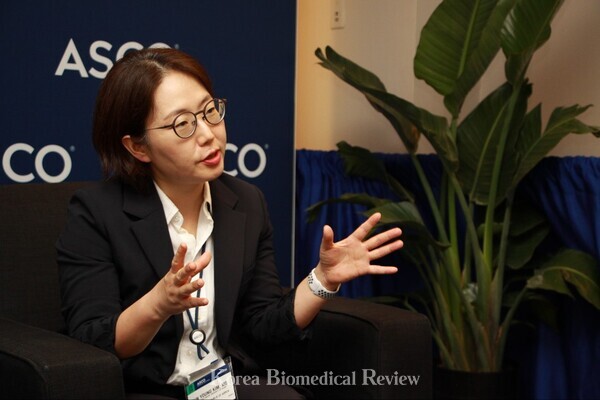CHICAGO, Ill. -- By Lee Han-soo/Korea Biomedical Review correspondent –- Korean researchers have presented findings from the KOSMOS-II study, which suggests new treatment opportunities for patients with refractory cancer who have exhausted standard treatment options during the American Society of Clinical Oncology (ASCO) 2024 Annual Meeting in Chicago.
Utilizing next-generation sequencing (NGS), oncologists are exploring new avenues for treatment, demonstrating positive outcomes for patients who had previously failed multiple therapies.
Central to this effort is the "molecular tumor board" (MTB), a Korean national expert panel that interprets NGS results and formulates personalized treatment plans, aiming to reduce regional disparities in precision medicine and enhance access to treatment used outside of the approved indication.

Korea Biomedical Review met with Professor Kim Sun-young of the Department of Oncology at Asan Medical Center during ASCO 2024 to learn more about the study and its implications for Korean patients.
According to Kim, the KOSMOS-II study is a national prospective observational study initiated by the Korean Cancer Study Group that aims to establish a gene mutation-based personalized treatment platform using NGS data.
The study involved 32 institutions across Korea, where an MTB consisting of oncologists, pathologists, and bioinformaticians reviews NGS results to recommend treatment options.
With a target of 1,000 patient data sets, the study's interim analysis presented at this year's ASCO meeting included 530 participants, Kim said. Out of these, 489 were evaluated by the MTB, and treatment plans were formulated for 380 patients.
The patients were assigned to therapeutic use of investigational drugs (TIER1), alternative treatment including palliative care (TIER2), or clinical trials (TIER3), she added.
Professor Kim highlighted that KOSMOS-I focused on analyzing NGS data, whereas KOSMOS-II included validating the efficacy of the recommended treatments.
"The MTB evaluation showed that 45.2 percent of patients were assigned to TIER1, 12.6 percent to TIER3, with a concordance rate of 54.6 percent between pre-selected treatments and MTB recommendations," Kim said. "Patients had a median of four prior systemic therapies, with some undergoing up to 15 treatments."
Notable treatments included Kadcyla (ingredient: trastuzumab emtansine), Perjeta (ingredient: pertuzumab), Avastin (ingredient: bevacizumab), and Tecentriq (ingredient: atezolizumab), she added.
Kim stressed that the study revealed a 16-week clinical benefit rate (CBR) of 34.8 percent among 158 evaluable patients, indicating that precision medicine could provide significant benefits even to those with advanced disease.
"For patients with no remaining treatment options, achieving a 35 percent control rate, maintaining partial response or stable disease for over four months, is substantial," Kim said.
Off-label drug use, still a challenge in Korea
Despite the encouraging results, Professor Kim noted several challenges in implementing KOSMOS-II findings in clinical practice.
"Currently, obtaining approval for off-label drug use is time-consuming, often requiring extensive documentation and committee reviews, delaying treatment for critically ill patients," she said. "The study aims to simplify this process by leveraging MTB recommendations as reliable evidence for expedited drug approval."
The study also aims to address regional disparities in access to precision medicine.
"Economic constraints and regional differences can limit access to NGS and expert MTB consultations," Professor Kim said. "A centralized discussion platform involving experienced professionals could mitigate these disparities."
Kim also highlighted the recent changes in NGS reimbursement and the ongoing medical school admission quota increase crisis as a significant hurdle.
"The recent reimbursement change has increased patient copayments for NGS from 50 percent to 80 percent, except for lung cancer patients, which has slowed patient enrollment," she said. "The ongoing medical school enrollment crisis further strains the capacity of oncologists to recruit and educate patients and families about the project."
Kim lamented that with half of the patient enrollment complete, the process is likely to slow down, potentially extending the study duration by two to three years.
Kim stressed that addressing these logistical challenges, including the need for appropriate compensation for MTB participants, remains crucial for the successful implementation of precision oncology.
"Even if the government adopts the MTB platform, ensuring adequate reimbursement is essential for its sustainability," she said.
Related articles
- [ASCO 2024] New subcutaneous Rybrevant boosts US entry prospects for Leclaza
- [ASCO2024] Moderna's individualized neoantigen therapy shows broad efficacy in cancer treatment
- [ASCO2024] Lunit's AI software aims to enhance accuracy in detecting HER2 ultralow levels
- [ASCO2024] Durvalumab shines as consolidation therapy for limited-stage SCLC
- [ASCO 2024] Osimertinib emerges as an ‘one-fits-all’ treatment for all stages of unresectable EGFRm NSCLC
- [Photo News] Leading pharma giants unveil cutting-edge oncology research at ASCO 2024
- Young-PEARL study’s survival data marks new milestone in premenopausal breast cancer at ASCO 2024
- [Reporter’s Notebook] Korea's clinical trial successes threatened by government policies, staffing shortages
- AMC Children's Hospital operated on 60,000 severely ill children in 15 years
- Korea’s KOSMOS-II precision medicine project wins top government award

